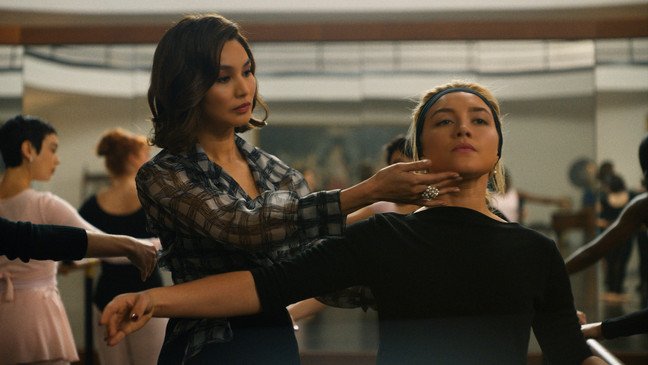Don't Worry Darling (dir. Olivia Wilde, 2022) — Review
"What are we doing here?" ponders Chris Pine, about an hour into Don't Worry Darling. Okay, Chris, we were asking the same question in your previous midcentury-styled shenanigan, aka Star Trek: Into Darkness (2014). But then as now, we all know what we're here for: sweaty, soft-porn fan service, and not much more in the way of intellectual development.
Don’t Worry Darling has become the pantomime villain of this awards season, dogged in equal measure by horror stories of torrid romances, enmities, and catastrophic British accents on set. Can it rise above? Well, with a plot that the sappiest Wattpad fanfiction author might even balk at, it doesn’t matter. As this half-baked manic-pixie-dream-bloke fantasia coasts to its next lucrative opening weekend, one can only toast the happy couple at its epicentre.
No no, not the actual characters! Olivia Wilde and Harry Styles, of course, aka recent ex of the lovable schlub from We’re The Millers, and the white one from One Direction who doesn’t already have a sprog. Leave aside the delectable drama of the production process — Styles’ and Wilde’s debated affair, the Tik-Tok broadcast debacle over Miss Flo — and what do you get?
Turns out, in the spirit of the great American entertainment — something pretty jazzy. Much of it may rest on Pugh, and indeed Wilde’s, implausibly chiselled and muslin-swathed shoulders. Call me a misogynist, but that’s fine with me. Domestic servitude, baby! They all look hot while doing it, okay.
Pugh, as beleaguered fifties housewife Alice, is the groaning girder of this Babylonian piece, holding off all-too-justified attacks on Styles and her fellow cast members with her well-recognised, feral early-twenties woman acting skills. An opening scene where she defends her maligned tuna salad sets the tone, with the vibes of a high-school drama acting exercise between her and an erstwhile husband. ‘You can’t leave, you’re not feeling well’, she entreats, with the desperate conviction of a children’s birthday party entertainer trying to wrangle the uncooperative birthday boy. As such, although his accent flits between counties and continents, Styles (Jack) does his cow-licked best, gamely playing along with his on-screen wife, and more convincingly with the leopard-bikini sporting MILF better known as his director. Wilde is in top form here, rolling cat-lined eyes in an ardent and somewhat convincing defence of the ‘utopian’ fifties community in which the suspiciously multicultural gang reside.
Even at its most evil, the opulent chocolate-box cinematography of a begrudging paean to the American Dream does the heavy lifting here. Like a diversity-reissue postcard, or a music video for its main box office draw, Don’t Worry Darling latches onto its meat and potatoes with squealing sendups of nuclear family imagery. The queer-baiting for which Styles is often criticized finds a new outlet in the creepy, Asian-led ballet corps of Gemma Chan’s Shelley. With those lacquered fingernails clutching my sternum, I’d be questioning my marriage too, Alice.
From here, the film devolves into what can only be described as post-girlbossism: like postmodernism, but more frilly and less prone to being roasted by Prince Charles, even if it really should be. We get all the trappings of the girlboss: leather-furnished desk, activewear, blah blah. But what’s really going on? In the relationships, as in the edgy dystopian sci-fi plot, more digging is required. Even as the elders of the cast (aka Wilde and Chan) sink into the drag-queen malignancy of old time Disney villains, the rich, cushy layers of fan service — for those who’ve buoyed DWD to the top of the commercial charts, even as it sinks to the bottom of Rotten Tomatoes — are ripe as ever. Most Gen-Z women — including Styles’ substantial queer fanbase — would only dream of making a roast and then having the former One Direction frontman dive into her crotch on the dining table instead. Flinging away the ceramic trappings of the patriarchy — hey, that veggie casserole looked perfectly tasty! — we’re treated instead to one of many clunge-guzzling sessions that looks as bland as the fifties cuisine. ‘Miss Flo’ may have insisted that these were ancillary points, but Wilde’s direction says otherwise. Ironically, Chris Pine, as the incel-ish problematic white man behind the whole ‘Victory Project’, seems to emerge from the movie with more of a leg to stand on than any of his foes, fictionally at least. Yikes.






